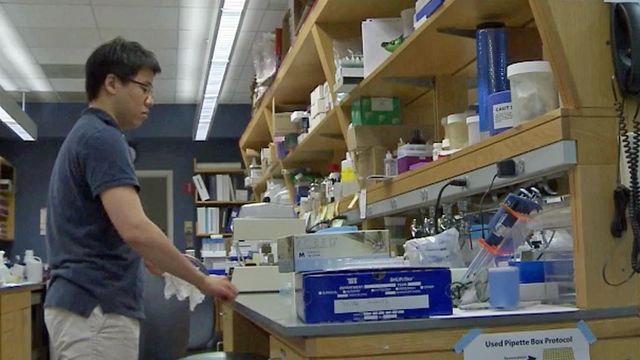Komen grants $3.6 million to Duke, UNC breast cancer research
The grants represent a huge return on the $281,000 the Komen North Carolina Triangle to the Coast Affiliate sent to support national programs.
Posted — UpdatedThe grants represent a huge return on the $281,000 the local Komen affiliate sent to support national programs.
“Of the net funds we raise, 75 percent stays here to support our local community health and education programs," said Pam Kohl, executive director of the Komen North Carolina Triangle to the Coast Affiliate.
"We are so proud to be able to work with Duke and Carolina and fund the kind of work that they're doing," she said.
“In 2013, our affiliate contributed $281,000 to the national research. To have $3.6 million returned to our area is a remarkable return on investment.”
Two of the largest grants go to researchers at Duke University.
- Dr. David Kirsch is working to understand how radiation therapy can cause heart damage in breast cancer patients and testing new cancer therapies to prevent that side effect.
- Dr. Donald McDonnell is investigating how tumor-associated macrophages (TAMs), a type of cell found around or within tumors, “trick” the body’s immune system to keep it from recognizing and destroying cancer cells. His team wants to learn if new drugs can be developed to target an enzyme present in TAMs.
Komen sponsors first study of environmental link
Among research funds Komen sent to Duke is a portion of a $4.5 million investment in the study of the role of the environment in breast cancer development. Duke is one of four institutions to work on that problem. Others are: Brigham and Women’s Medical Center in Boston; Emory University in Atlanta; and the University of Southern California in Los Angeles.
“In each of these grants, we are attempting to move beyond theories to establish a solid base of scientific evidence on the role of environmental exposures to breast cancer development,” said Chandini Portteus, Komen's national chief mission officer.
Among the projects at Duke is one to consider the impact of radiation therapy on the heart. "We're hoping to understand how radiation affects the heart and causes damage and hopefully develop ways to protect the heart from radiation-induced injury," explained Dr. David Kirsch, a radiation oncologist at Duke.
Researchers will also study:
- The potential impact of exposure to environmental pollutants in areas where breast cancers are disproportionately high, or in so called “cancer clusters”
- The impact of air pollution on breast cancer development
- The role of synthetic chemicals (phthalates) found in consumer products and medications in breast cancer development.
"The incidence of breast cancer is 11 percent higher in eastern North Carolina than the rest of the nation. The breast cancer mortality rate is 20 percent higher. That suggests some environmental factors play a role," said Dr. Allen Mask.
The work of researchers at Duke and UNC could make a difference in the future diagnosis, treatment and outcomes for cancer patients in the Triangle.
"The work of UNC's Dr. Lisa Carey can help us better understand how breast cancer spreads and how to prevent it," Mask said. "She's also working at how well breast cancer drugs are working, and how we can prevent resistance to those drugs."
• Credits
Copyright 2024 by Capitol Broadcasting Company. All rights reserved. This material may not be published, broadcast, rewritten or redistributed.





